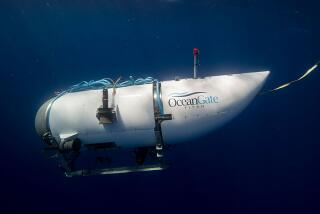Around the world with a Pythoneer
- Share via
Michael PALIN was always my favorite loose screw in TV’s “Monty Python’s Flying Circus,” so when he started making travel shows for the BBC in the late ‘80s, with books to accompany them, I took note.
I don’t especially like television travel, which usually seems preternaturally cheerful and stagy. But Palin’s shows make no secret of the fact that he travels with a film crew, and they often dwell on the unromantic bits -- the exhaustion, foul smells, bed bugs, breakdowns and delays -- that all real travelers know too well.
Who better to travel with than the man who played stuttering Ken in the 1988 movie “A Fish Called Wanda”? On the road, he seems willing to try anything, meet everyone and discuss everything -- including his bowel movements. His attitude is what he once called “ruthless niceness,” which is a capital way to see the world.
He started in 1989 following the footsteps of Phileas Fogg in his own version of “Around the World in Eighty Days.” His next series, “Pole to Pole,” took him from the top of the world to the bottom along the 30-degree east line of longitude. Then he toured the lands that border the Pacific Ocean in “Full Circle,” tracked down places put on the map by his favorite novelist in “Hemingway Adventure” and fulfilled a long-cherished dream to see the great desert in “Sahara.”
I caught up with Palin for a chat by phone from his home in England. He had just spent six months filming a new series on the Himalayas that goes from the Khyber Pass to the mouth of the Ganges River in six shows. The travelogues will air in England on BBC1 in the fall. (The U.S. showing is, as yet, unscheduled, but “Himalaya,” the book that accompanies the series, will be published next spring by St. Martin’s Press.)
Question: Just why, exactly, do you spend so much time talking about your bowels?
Answer: [He laughs.] Travel disrupts all physical patterns, so travelers are naturally concerned about health.
Q: When you’re at home, you’re a comfortable family man, but at the same time you have this lust for adventure. Isn’t that a dichotomy?
A: Well, there’s really no contradiction between wanting to travel and being a happy family man. Travel is rather like being obsessed by some sport. And a good relationship can survive long absences. I’m a much easier person to get along with because of traveling.
Q: Where did your adventurous streak come from?
A: When I was a boy we still had the empire, a British legacy. I collected stamps from all over the world with kings and queens on them and miniature locomotives named for the colonies. I was always imagining any place different from where I was.
And there wasn’t much money to travel. In the ‘50s, it was really for the rich. There were no cut-rate flights. I was 12 the first time I went to London.
Q: Nowadays, where do you go for fun?
A: My wife and I tend to go each year to the Lot Valley in France, where her family has a farmhouse. It’s a real haven.
Q: Do you like luxury or backpacker-style travel?
A: I prefer reasonably rough travel interspersed with bouts of extreme luxury. You have to get off the beaten track to see the really interesting parts of the world. But travel is physically exhausting. You have to make sure that at some point you can get clean and comfortable and healthy so you can go on.
Q: What’s the worst hotel you’ve ever stayed in?
A: There could surely be little worse than a hotel just across the Ethiopian border from Sudan. We couldn’t get to a town that night, so we stopped in a village. The hotel was a kind of daub and wattle [whitewashed woven stick] enclosure with animals and stalls. I thought the stalls were for the animals, but they were the rooms. Mine had a blanket with a waxy feel. It was hot and sticky. Cockroaches were skittering up the walls, and people just beyond the daub and wattle were very active, doing lots of yelping. The next morning, I couldn’t get out of the place fast enough.
But I have found that whenever I suffer, people love it. It confirms what travel is really like for experienced travelers. For nontravelers it confirms why they never leave home.
Q: Bad places seem to make the best stories, don’t they?
A: But there is a certain danger in romanticizing. While [I was] filming in Tibet it was always bitter, gnawing cold. I could never get warm. There were lots of grim nights. But yesterday, I was looking at pictures from Tibet, and said, “I have got to get back there.”
Q: Does your sense of humor save you?
A: ‘Tis an English tradition. [Authors] Eric Newby and Evelyn Waugh had it. It helps you survive dangerous, unpredictable, uncomfortable situations. There’s no logical reason for them, so you just have to laugh.
Humor is also a way of communicating with people. I’m no great linguist. I rely on gesture, attitude, even just a smile. Smiles are disarming everywhere in the world, except with people in uniform. I talked to the Dalai Lama for the Himalaya series. He said he always smiles. If he gets a smile back, he knows he’s all right.
Q: Do you have any handy-dandy Michael Palin travel tips?
A: It is better to take toilet paper in flat packs because rolls get squashed.
You may e-mail Susan Spano at postcards@latimes.com.
*
More Palin
For more information on Michael Palin’s travels, go to www.palinstravels.co.uk.
More to Read
Sign up for The Wild
We’ll help you find the best places to hike, bike and run, as well as the perfect silent spots for meditation and yoga.
You may occasionally receive promotional content from the Los Angeles Times.






